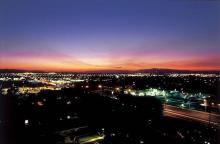Leaders in Lancaster, California, Authorize Resolution to Allow City to Move on Muni, Other Utilities
At a Lancaster City Council meeting on May 14th, community leaders voted unanimously to take a step toward establishing several municipal utilities, including a publicly owned fiber optic network.
Good Experiences with Their Public Utility
Lancaster Choice Energy (LCE) is the city’s municipal electric utility, but in the future may be one of several publicly owned utilities. LCE has a Community Choice Aggregation (CCA) program, which allows individual users within the community to join together for purchasing power and gives them more control over matters such as the source of their energy. Lancaster wants to become a net-zero city and is exploring a range of approaches to reach that goal.
The community also underwent traffic signal upgrades like many other California communities and has installed additional fiber as the city has started to implement Smart City initiatives. At the city council meeting, City Manager Jason Caudle noted that using the fiber optic assets to develop a community network was a strong possibility.
In an article in the Antelope Valley Press published prior to the meeting, Caudle also noted that they plan other uses for the fiber, “As part of our smart cities effort, we’ve installed fiber-optic networks already throughout our city, and then we’re looking at putting our streetlights into Wi-Fi hotspots as well as 5G networks,” he said.
In his report to the council, Caudle wrote:
The establishment of a municipal utility is the next step in continuing to ensure that citizens and businesses are provided with utility services that meet the current and future needs of the community. As a municipal utility, Lancaster will have the opportunity to utilize advanced technology, provide utility services at rates and charges that are fair and reasonable, provide high quality customer service, and provide alternatives to existing providers of utility services similar to what the City achieved through the development of the City’s CCA.



